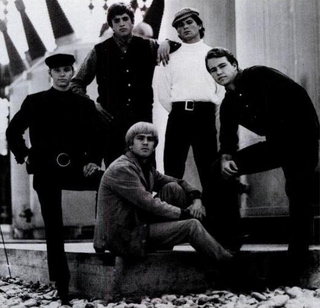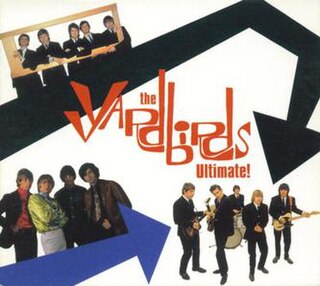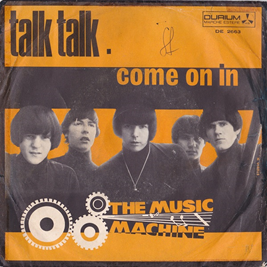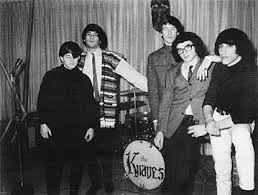Garage rock is a raw and energetic style of rock and roll that flourished in the mid-1960s, most notably in the United States and Canada, and has experienced a series of subsequent revivals. The style is characterized by basic chord structures played on electric guitars and other instruments, sometimes distorted through a fuzzbox, as well as often unsophisticated and occasionally aggressive lyrics and delivery. Its name derives from the perception that groups were often made up of young amateurs who rehearsed in the family garage, although many were professional.

The Electric Prunes are an American psychedelic rock band, formed in Los Angeles, California, in 1965. Much of the band's music was, as music historian Richie Unterberger described it, possessed of "an eerie and sometimes anguished ambiance." It mainly consisted of material by songwriters Annette Tucker and Nancie Mantz, though the group also penned their own songs. Incorporating psychedelia and elements of embryonic electronic rock, the band's sound was marked by innovative recording techniques with fuzz-toned guitars and oscillating sound effects. In addition, guitarist Ken Williams' and singer James Lowe's concept of "free-form garage music" provided the band with a richer sonic palette and exploratory lyrical structure than many of their contemporaries.

The Shadows of Knight were an American rock band from Chicago, Illinois, that played a version of British blues influenced by their native city. When they began recording in 1965, the band's self-description was "the Stones, Animals and the Yardbirds took the Chicago blues and gave it an English interpretation. We've taken the English version of the Blues and re-added a Chicago touch," to which rock critic Richie Unterberger commented: "The Shadows of Knight's self-description was fairly accurate."

The Music Machine was an American rock band formed in Los Angeles, California in 1966. Fronted by chief songwriter and lead vocalist Sean Bonniwell, the band cultivated a characteristically dark and rebellious image reflected in an untamed musical approach. Sometimes it made use of distorted guitar lines and hallucinogenic organ parts, punctuated by Bonniwell's distinctively throaty vocals. Although they managed to attain national chart success only briefly with two singles, the Music Machine is today considered by many critics to be one of the groundbreaking acts of the 1960s. Their style is now recognized as a pioneering force in proto-punk; yet within a relatively short period of time, they began to employ more complex lyrical and instrumental arrangements that went beyond the typical garage band format.

"Shapes of Things" is a song by the English rock group the Yardbirds. With its Eastern-sounding, feedback-laden guitar solo and anti-war/pro-environmental lyrics, several music writers have identified it as the first popular psychedelic rock song. It is built on musical elements contributed by several group members in three different recording studios in the US and was the first Yardbirds' composition to become a record chart hit. When it was released as a single on 25 February 1966, the song reached number three in the UK and the top-ten in the US and Canada.

The Rising Storm is an American rock group that was active at Phillips Academy in Andover, Massachusetts, United States, between 1965 and 1967. Their music is considered to belong in the folk rock and garage rock genres. The original members of the group were Bob Cohan (guitar), Todd Cohen (bass), Charlie Rockwell (keyboards), Tom Scheft (drums), Tony Thompson, and Rich Weinberg.

Ultimate! is a comprehensive career retrospective album by English rock group the Yardbirds. The 52-song two–compact disc compilation was released in 2001 by Rhino Records. The tracks span the period from the group's first demo recordings in 1963 to the last singles in 1968. They include all 17 of the group's singles, both A-side and B-sides, supplemented with more than a dozen album tracks, their performance for the film Blow-Up, and three early solo numbers by singer Keith Relf.

Volume 3: A Child's Guide to Good and Evil is the fourth album by the American psychedelic rock band The West Coast Pop Art Experimental Band (WCPAEB), and was released on Reprise Records in May 1968. By the time the group commenced recording Volume 3, guitarist Danny Harris had excused himself from the WCPAEB, reducing their numbers to a trio. As with the WCPAEB's earlier work, the album saw the band continue to blend psychedelic influences and complex studio techniques, and was marked by a bizarre fusion of innocence and malice in the band's lyrics. Volume 3 featured the WCPAEB's most ambitious music to date, and the striking cover art of John Van Hamersveld, yet it failed to sell in sufficient copies to chart nationally. In more recent times, the album has been considered the band's most accomplished work and a masterpiece of the psychedelic genre.

Back Door Men is the second album by The Shadows of Knight. Both this album and its predecessor, Gloria, were released in 1966 and are considered to be seminal garage band albums. As noted by one reviewer, "The original LP version of this album, the second by the legendary white Chicago garage punk/blues outfit, was one of the most sought-after artifacts of mid-'60s punk rock. Back Door Men was a loud, feedback-laden, sneering piece of rock & roll defiance, mixing raunchy anthems to teenage lust, covers of Chicago blues classics, raga rock, folk-rock, and a blues-punk grab off of commercial Top 40, all on one 12" platter. What makes the record even more startling is that every one of these tracks, however far afield they go from one another, works.".

Gloria is the first album by the Shadows of Knight, released in 1966 on Dunwich Records 666. The Shadows of Knight are primarily known for their hit version of the Van Morrison penned Them band's "Gloria", but the band today is regarded as one of the original punk bands.

San Fran Sessions is a box set compilation which collects 60 demos, outtakes, rarities and unissued performances recorded by The Beau Brummels from 1964 to 1966. The three-disc set, released by Sundazed Records on June 11, 1996, includes alternate takes of the band's singles "Laugh, Laugh" and "Just a Little", as well as early versions of songs that were likely targeted for their never-completed third album on Autumn Records.
Not to be confused with Styx (band)

Sugar and Spice is the 1966 debut album by The Cryan' Shames, originally released in mono and in stereo. The cover photography was done by Don Bronstein. The album was recorded in two days. The liner photography was done by Rich Dienethal of River Grove, Illinois. The cover photograph was taken at The Sweet Tooth in Pipers Alley, Old Town, Chicago. The album is dedicated to Fred Bohlander. The back of the album contains six photos of the band in concert. There are four original songs on this record, all written by lead guitarist, Jim Fairs: "We Could Be Happy", "Ben Franklin's Almanac", "July" and "I Wanna Meet You".

"Talk Talk" is the debut single of American garage rock band The Music Machine. It was released in November 1966, and produced the band's only Top 20 hit on the Billboard Hot 100. The song was included on their debut album, (Turn On) The Music Machine.

The Knaves were an American garage rock band formed in Chicago, Illinois, in 1964. The band released two singles during their existence, including the song "Leave Me Alone", which is now considered a classic of the musical genre of garage rock. In addition, the group's sound was particularly unique for combining elements of folk rock and proto-punk, making the Knaves stand out among their contemporaries.

"Action Woman" is a song by the American garage rock band the Litter, written by their record producer Warren Kendrick, and first released as the group's debut single on Scotty Records in January 1967. The song also appeared on the band's first album Distortions. Although "Action Woman" never broke out on the national charts, it is now revered as a classic piece of the musical genre of garage rock. Accordingly, the composition has appeared on several compilation albums, and has been the subject of cover versions.

The Remains is the debut album by the American garage rock band the Remains, and was released on Epic Records in September 1966. Though the album was largely overlooked at the time of its original release, The Remains has since received recognition as one of the more cohesive efforts of the era.

"You're a Better Man Than I", alternately listed as "Mr. You're a Better Man Than I" or "Better Man Than I", is a song first recorded by the English rock band the Yardbirds. It was written by brothers Mike and Brian Hugg, and became the opening track to the group's second American album, Having a Rave Up with the Yardbirds (1965). Three months later in February 1966, it was released in the UK as the B-side to the "Shapes of Things" single. With its politically conscientious lyrics and catchy melody, "You're a Better Man Than I" has been covered several times. The most successful rendition was recorded by American garage rock band Terry Knight and the Pack, who earned a minor national hit with the tune.

The Kreeg were an American garage rock band from Albuquerque, New Mexico who were active in the 1960s. They were one of the most popular groups in the Albuquerque area and enjoyed local hits from both sides of their 1966 single "How Can I" b/w "Impressin'". Their work has come to the attention of garage rock enthusiasts with the release of the 1996 anthology Impressin', which features their complete recordings.

Distortions is the debut studio album by American psychedelic and garage rock band the Litter. It was released on May 1, 1967, by Warick Records and includes their hit single, "Action Woman.


















